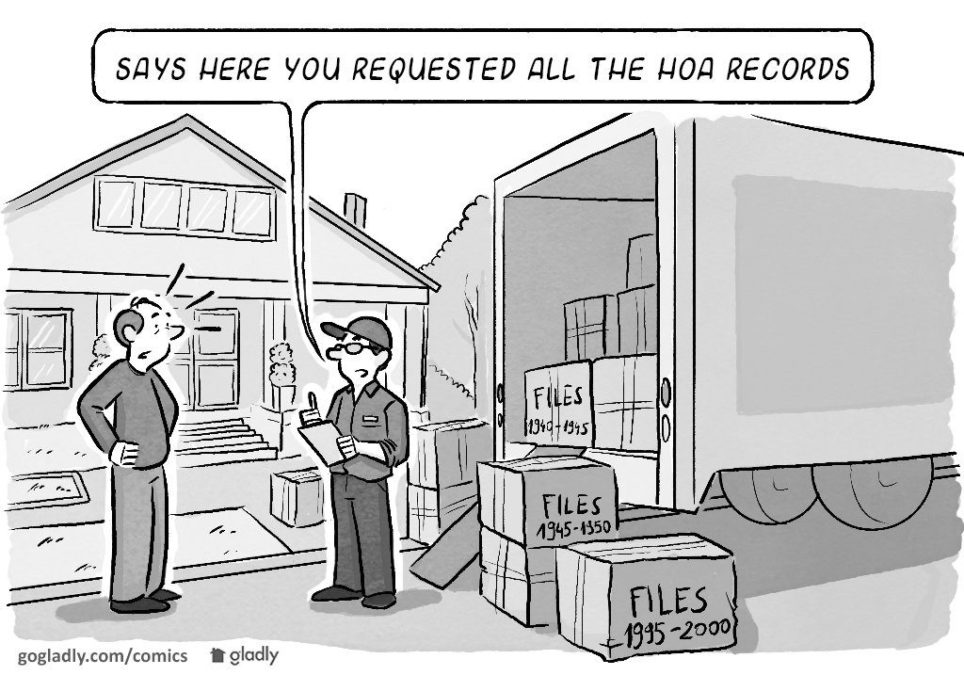Many community associations maintain documents and HOA records for many years, even decades. Most state laws require that owners be allowed to inspect records of the association under specific conditions, but the inspection right is broad. In some cases homeowners will request documents in an effort to conduct a witch-hunt against the HOA. So how long do you keep HOA records, and what records need to be kept?
What’s a Record?
The term “record” is not necessarily defined in most jurisdictions. Therefore it is presumed that any document that the association keeps in its file that relates to association business is a “record” of the association (this includes electronic records too). Of Course, certain information may be privileged and not available for owner review, but we must assume that if you’ve kept the document in your file, in a box, in your desk, or in your computer, and it relates to association business and operations, which could range from financial statements, receipts, contracts and to member correspondence, that is available for inspection by an owner.
What most associations do not understand is that the law, in your respective jurisdiction, only requires that certain records be kept for a certain period of time. If you’re not required to keep a record, why keep it? Keeping records for indefinite periods of time only opens the door for a disgruntled owner to scrutinize a decision or transaction made by the board and such scrutiny usually comes when the board has taken enforcement action of some kind against that owner.
Save It or Shred It?
In Utah, the declaration, bylaws, plat map, resolutions, articles of incorporation, meeting minutes, and some similar documents are required to be kept permanently. Also, the most recent annual report delivered to the division of corporations is required to be kept for a period of 3 years. However, most associations don’t realize that all other records (be sure to review your state law) can and should be discarded upon being inapplicable to current operations of the association. For example, if you have an election and you have a ballot certification committee who tallies the results, why keep the ballots for the next year or two when you have certified results that are in a single document form? Discard the ballots as they are no longer needed. Hoarding the ballots will only give owners something to scrutinize when some scrutiny is not appropriate or necessary. Further, why keep receipts for items purchased years ago, unless you’re keeping it for a warranty purpose? It should be discarded because the cost of such will be reflected in the regular statements of the association anyways.
Knowing What HOA Records to Keep
Boards need to be a little bit careful about discarding records that help them with their operations. For example, often times when owners are deemed to be in violation of a parking restriction, the owner will request all records that show that similar letters have been sent out about the same violation. If the association no longer has those records because they have discarded them, the board will be unable to prove that it is treating everyone equally. We recommend that those types of communication and correspondence be kept for a longer duration of time.
Every association should have or adopt a records retention policy. A records retention policy states which document are to be kept and for how long, whether permanent, one year, two years, three years, etc. A board that wants to adopt a records retention policy should first check their state laws to determine which records need to be kept by statute and which do not. The board should then work with the association attorney to adopt a records retention policy that best fits the needs of their association. They may find that they are holding onto some records for too long or that they need to hold onto other records for longer.
- The Pesky Nuances of the HOA Collection Policy - July 26, 2017
- HOA Legal Costs — Who’s Running Up The Bill? - October 19, 2016
- HOA Records — Save or Shred? - September 8, 2016



 Help
Help
Great article to an all too common problem. In our board-consulting position, we often come across that boards don’t have time to get rid of old records. We worked with one board that had time stamp cards for employees since the 80’s (30+ years worth) and “needed” to buy another filing cabinet for them:) As cost consultants, we stopped that plan!